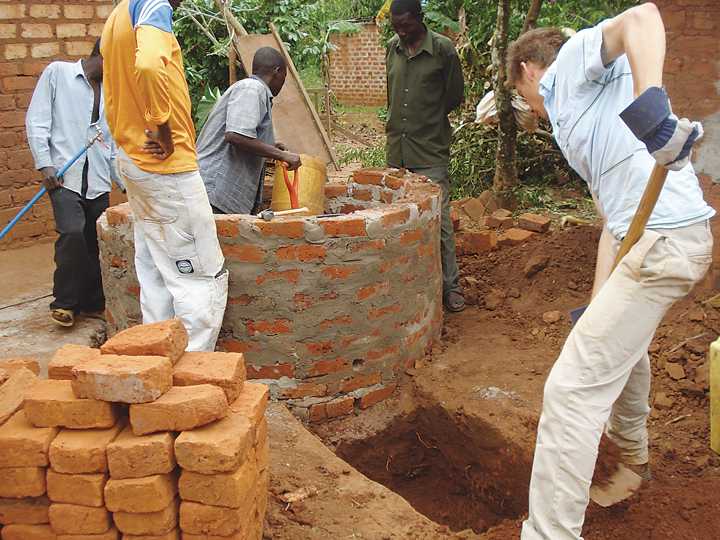Engineers for a Sustainable World participates in bevy of projects
Courtesy photo: Meghan Roberts
Engineers for a Sustainable World – Uganda
November 28, 2010
When it comes to sustainable engineering, Engineers for a Sustainable World focuses its projects from both a local and international perspective.
“That’s a big part of what we do, and that’s really the big reason that ESW started in the first place, looking at places around the world and helping them to meet their own needs,” said Sam Harting, senior in mechanical engineering and student who works with local projects for ESW.
The nationwide student organization already completed work in Uganda with the design of bio-gas digesters and rainwater harvesting tanks.
“In the past few years, we’ve mainly worked in Uganda, which was where we mainly focused on one area: bio-gas digesters,” said Pasha Beresnev, senior in civil engineering and ESW vice president. “We could use the methane gas produced from animal wastes to produce electricity. Those were used to power lights and small cooking stoves, as well.”
Beresnev, along with other engineering students, worked on various designs for the rainwater harvesting tanks. The students traveled to Uganda during the past few summers and constructed three tanks to collect rainwater and store the fresh water for drier seasons.
“Until last year, we were predominantly focused on international projects, looking at different communities that we have partnerships with,” Harting said.
The students have initiated their projects with other countries, including India and Nicaragua, to implement solar projects.
More fig trees are produced than can be used in India, and often the fruit rots. ESW is trying to create a way to store the figs to prevent any rotting so the residents can make a profit from them.
“We’ve been working on a prototype, and basically it’s a cabinet-style fruit dryer,” Beresnev said. “It would be connected to a solar panel, which is used to heat up the inside of the cabinet, and then just by the nature of the cabinet — it’s wood — and if it’s outside all day, it would heat up as well. There would be a lot of heat going in there. It would circulate throughout the different racks, and you’d just put the fruit on the racks and they would dry.”
Crop irrigation is becoming an issue for farmers in India. ESW’s goal is to use rainwater harvesting to obtain and distribute water for farmers using a technique called surface run-off.
“Surface run-off would be where most of that water would come from for the irrigation purposes,” Beresnev said. “The water would run off of the surface, and that would create these big open tanks that capture all the water that’s flowing down there in the tank. From there you’d be able to connect it to some pipes and use it to irrigate the land.”
Domestic water is another issue in India. Planning to use similar concepts they’ve used in Africa, ESW members want to construct a personal household tank to be used throughout the year for household purposes.
The students have been working recently in Nicaragua, implementing water irrigation systems such as drip-irrigation and ram pumps.
“We’ll be collecting water off the roof and developing a ram pump, which uses a river current to build up energy, essentially,” Roberts said.
Solar street lighting is an idea ESW not only wants to introduce to India but on the ISU campus as well.
“We work with facilities planning and management to find a spot that would work, somewhere that is not easily accessible for their grid,” said Meghan Roberts, senior in civil engineering and president of ESW. “A place that’s far off campus, so maybe a golf course or walkway. Something that is a place that’s not easily accessible for them, and it’d be a high cost for them to get a light out there.”
The student organization has a team currently working on incorporating solar street lights on campus. Beresnev hopes to have some up by next semester with funds to construct the lights in India.
The goal for the group is to become more local with projects, including constructing a greenhouse for ISU Dining.
“We’re looking into a lot of the logistics to go into [the greenhouse],” Harting said. “We’re looking into costs, and hopefully by spring break, we’ll have a proposal to give to ISU Dining.”
They have also done energy audits throughout campus and with Becker Underwood, a local company.
“We were working with a local company, Becker Underwood, to do an energy audit on some of their facilities and address their energy issues,” Harting said.
To help encourage student involvement and get the word out, ESW has a goal to affliate with other student green organizations, including the GreenUmbrella and Live Green! Initiative.
“The only way we can get our name out there and do a lot of things is just by having a lot of student involvement,” Beresnev said. “If that’s not there and students aren’t excited, then that’s just hard to do.”
Roberts, Harting and Beresnev all participate in ESW with the desire of giving students the opportunity to engage themselves with projects that make an impact on society, explicitly with sustainability.
“ESW really tries to do a lot of projects and give students some hands-on experience in engineering, and I think that comes from the international organization,” Beresnev said. “They try to get each chapter involved in different projects to provide support for that.”
“It’s been very beneficial helping me just to learn to design for real-world applications and to be made aware of what’s going on in the world and not ignoring what’s happening in other places,” Roberts said.
During upcoming spring break, the group plans another trip to Nicaragua to continue working with the rain-harvesting tanks.

















